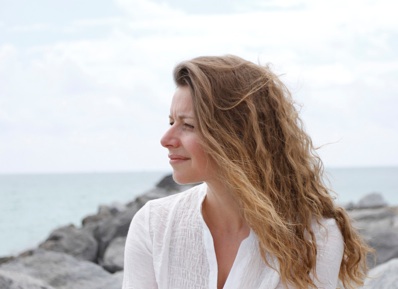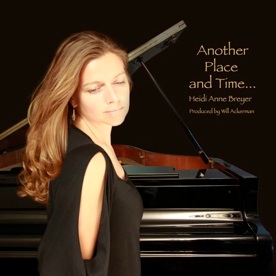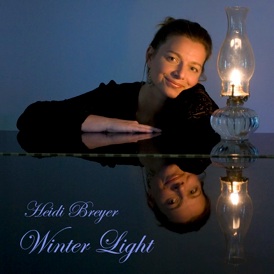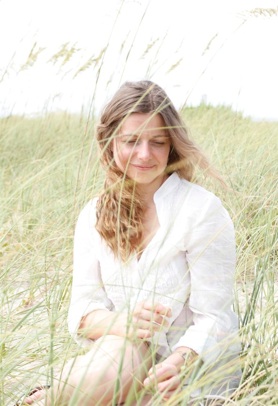The Heidi Anne Breyer Interview: The English Lady takes a “tea break” and chats with Mainly Piano.
While many of you may think that 2010 represented the arrival of pianist Heidi Anne Breyer courtesy of her highly acclaimed
Another Place And Time, this was actually her sophomore effort. If you want to be a little more inquisitive about this new talent you would need to rewind to 2009 and look for her impressive debut
Winter Light. The technical care of Will Ackerman and the Imaginary Road Studio A Team on her second effort would no longer allow Breyer’s talents to be concealed. In fact,
Another Place And Time hit several best of lists for 2010 and remains one of the year’s most pleasant surprises.
Born and raised in England, Heidi studied at the Trinity College of Music in London and quite clearly her upbringing has shaped her both professionally and personally. Nevertheless, a move to the US over 15 years ago only further influenced her in every capacity. But try labeling her music and you would be hard pressed to accurately describe it. There are the obvious roots in the Classical and New Age genres label but branding her music is a challenge. How it makes you feel is easy and a whole different story…inspired, touched and moved are a few adjectives that come to mind.
For Heidi, 2010 was quite something else as
Another Place And Time really took off and appealed to the critics. Yet, she humbly refers to herself as an emerging artist though if you sit through her latest creation it has all the makers of an old pro that sounds like she is well into own recording portfolio. Heidi was kind enough to not only to give us some insight on the recording process at Imaginary Road Studio, but more importantly share with us the years of hard work behind what on first blush has the appearance and ingredients of an overnight sensation.
MD: According to your website you were born and raised in England which also included your musical education. How has that particular culture affected your musical playing and career?
HB: Birth and upbringing in England has influenced and shaped my career immensely despite having lived in the U.S. for over 15 years and immersing myself in the American culture.
Earning my honors degree and teaching qualifications at Trinity College of Music in London and drawing on that knowledge led me down the path of teaching and playing solely classical music for years. I have maintained a roster (for the last ten plus years) of anywhere between 20 and 30 students. I have performed with chamber and choral concerts and accompanied many soloists and string and wind ensembles…and even played the organ (a completely foreign instrument and MUCH different to piano) for three years at my local church.
So my career grew from a rather solid academic root and England provided all of that. England is changing, becoming a much more open society that goes against their historically conservative psyche. And in a lot of ways that is a good thing. Balance between personal conservatism and the degree to which one feels comfortable/obligated to speak out plays a huge role in shaping one’s life. Wherever you are brought up, those formative years are hugely influential and they form the foundation of one’s future, and one’s creative output.
MD: Your music, while warm and inviting appears to have an underlying classical feel to it. How would you describe your music to the newly invited guest?
HB: Intimate, introspective, not merely contemplative either, real core of emotion stuff, piano instrumental music. Funny, you ask the question as if warmth and classical are mutually exclusive…
Ideally I’m sure most musicians would prefer to not have their music categorized or labeled at all though I am fast learning that this is inevitable. Several colleagues have mentioned Bill Evans, a bit of Keith Jarrett in the close chords (not speed, obviously).
It’s not truly classical, not really New Age and not even Neo Classical - all of them combined I guess. Additionally, having claimed everything about classical studies and academia…paradoxically my music is a complete departure from that and not by design either.
A colleague of mine, very successful in the New Age genre, had obviously read about my background and immediately assumed it to be academically approached and each moment of stillness calculated. On the contrary! I am very fortunate to be able to allow that education to simply sit in me while I dig deep spiritually and draw from my soul and my life experiences. There are parallel 5th’s and octaves all over the place if you analyze it theoretically…the classical composition student would have a field day ripping it apart!
MD: If you were to pick three genres and artists, who and what would be the most influential on your music?
HB: Ok I’ll stick to three genres…Classical Music Pachelbel, Bach, Chopin, Rachmaninoff and Satie (I’m stretching the boundaries here, I know).
Janis Ian from a vocal perspective. Actually, she has given me permission to do a vocal arrangement of one of her songs on my upcoming album. It will be recorded in July.
Bill Evans and Keith Jarrett from recent years.
MD: Many of your new fans may think that 2010’s Another Place And Time was your solo debut when in reality your first exposure to the general public came courtesy of 2009’s Winter Light. It appeared that your freshman effort focused on winter carols. Why the Christmas theme as a debut album? Was this a testing of the waters?
HB: All of my fans are new and I feel blessed with each one. There was not a lot of water under the bridge between 2009 and 2010 and the two albums, not in terms of marketing or fan base anyway. I am an emerging artist and learning so much everyday about this small corner of our industry, with its huge potential. Most people who have heard
Another Place and Time know about Winter Light or the other way around. They came in such close proximity it was unavoidable.
Winter Light, was an experiment, an idea that was suggested by a close friend of mine. The “just do it, give it a try” discussion…I don’t know how many people release debut albums for Christmas but it happened just so and Christmas music is very familiar, joyous and comforting to me so the process was extremely fulfilling.
MD: The album included a total of 11 tracks of which six were vocal renditions which does not include the spoken narrative on “Hope” (a glorious accent from the Mother Land I might add). “Of The Father’s Love Begotten” is not only a gorgeous vocal performance that slowly builds but the keyboard and string arrangements are equally impressive. Would you walk us through the creative process of this particular song?
HB: There was no planned process. The writing process happens differently with each composition. It was a journey that started long before the arrangement was written. I always loved that hymn and I love Wilbur Held’s contrapuntal organ version of it. I had chanted the psalm each Sunday for a good while, sang in the choir each Sunday and Wednesday…then began to learn Logic Pro. I merely drew from all of these simple experiences. And so it came quite easily. Though I say in the liner notes it is based on the Wilbur Held version (and it does have some likeness) his is less romantic with less suspensions and many different harmonies…and conversely I heard voices and strings and just went about it bit by bit.
Whether you write for solo piano or symphony orchestra, whether you paint or design for a living, any creative process has a muddy phase and you have to simply work through it to reap the reward at the end. I LOVE composing!
MD: Despite your commendable arrangement and production qualities on your debut you decided to hire Will Ackerman as the producer of Another Place And Time. Why the change?
HB: My whole life has been about learning rather than knowing. And for fear of sounding arrogant, anyone that knows me well knows I am a fast learner. Although I change direction a lot in life, in music, in feelings too actually, it is because I’m constantly absorbing and processing…and learning.
Here’s a guy who has come from a polar opposite musical experience to mine. Different instrument, untrained artist, highly successful commercial experience, obviously outstanding productions skills (I had not even been in a studio, much less observed a producer at work). All of this was irresistible to me; it would be to most I’m sure. But it was also simply a great singular experience and not one that needs to be repeated necessarily.
MD: It appears that there are many artists using the Will Ackerman team. What is a typical day at the Imaginary Road Studios?
HB: Begin at 10 am…having already mapped out the day, the day before. We build a road map of the first piece I am going to record.
This is important. They don’t follow music in their process obviously, but they need to understand the pieces I have composed to help me make the most of them during the recording. For example Will may hear a passage of notes differently to the way I interpret the same passage (actually this rarely happened, we pretty much felt the music the same way all of the time). That is what Will is there for though, to be a devil’s advocate, to push you to a musical place you have never been. I believe the essence of great producing.
What gets accomplished each day obviously varies. Every artist has a different capacity on any given day, and it also depends on the complexity of the piece. Sometimes one can get down three piano basics a day, sometimes more and sometimes it’s a struggle to get down one.
Sandwiches are key at lunch and we often work through lunch eating while we listen (makes for good percussion). We end usually between 6-7 pm and I almost always feel a combination of completely spent and totally inspired. Really wild and heady. So then I have to force myself to relax and eventually sleep. It is a discipline and one I am still learning.
MD: Your follow up effort included 4 tracks from your debut. Why did you want to revisit these particular tracks?
HB: Things grow and change. Like my inclination for learning, my music also evolves. Take “American Gothic” for example. This piece I believe may never be finished. I may never settle on the direction those first four chords take. I loved the addition of the muted trumpet in the second version and…this upcoming album we will have yet another iteration of both the piano composition and perhaps other instrumentation and still I may not be content to let it be?? I was also intrigued as to what I could learn by putting forth for professional production the same pieces I did myself. “Winter Light” barely changed. That was affirming to me…
MD: While Another Place And Time included some vocal renditions there was a greater emphasis on your piano work. What compelled you to refocus?
HB: Circumstance if I am honest. I went to Will as a composer (in my mind) not as a pianist. My piano skills had not been maintained well as a soloist really only as an accompanist and teacher for a long time and he turned that around. Working at IR made me practice, made me experiment and I began to compose on the piano more organically again… so it became a piano centered production, acoustically recorded vs. my big experimental phase with Logic during the previous year. Having said that I still work in Logic now but I see a distinct difference in my depth of creativity when going between the piano and my keyboard/Logic. WAY more creative on the piano even with all the bells and whistles Logic has. The caliber of the composition is compromised in Logic.
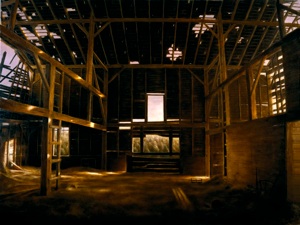
“American Gothic” by Alexander Volkov
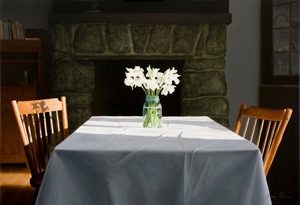
“Conversation” by Alexander Volkov

“Returning” by Alexander Volkov
MD: In your liner notes you share that five of your tracks were written in direct response to the art work of Alexander Volkov. Would you care to share how his work reflects in your music and tell us a little bit about the artist?
HB: Alexander is a Russian Realist that has spent the last 23 years in America painting his experiences both of the landscapes and the people in his life. In general his work has very many parallels with my music. Clear melodies and structure/clear form and texture, subtle nuances in tone/subtle nuances in color, they are very aligned.
Also we both have an innate sense of nostalgia that we were both born with and that we can’t quite explain. Perhaps that is why our art forms blend so well. Typically I look at a work of Alexander’s and project myself into the scene even if it is a portrait, (project myself into the emotion of the subject) and begin to compose
MD: One of your Volkov inspirations is “Conversation” that features your duet with Noah Wilding. There also seems to be several different passages. Would you care to elaborate on the passages?
HB: Yes. This was a song I wrote in response to the painting of the same name. A painting of empty chairs and a central table. The introduction represents the emptiness in the room, and with the cello entry comes the invitation to sit and talk. The lyrics (my vocals) describe a conversation that should have taken place but sadly never materialized something that can haunt us all at one time or another.
I wanted to imagine the feelings for either person after that conversation…and just naturally took the piece into the major and the rest came very swiftly. Noah’s ambient voice at the end gives a whisper of the human connection, reminding us it never happened and of the opportunity lost.
MD: “In A Region Of Clouds” has a glorious title to it and also includes you collaborating with Will Ackerman both at a songwriting and performance level. The music is as inspiring as the title of this gentle song. Tell me about the creative process.
HB: In A Region of Clouds–‘Piano’ is the title on my album. That last word is important as it differentiates two versions. Will wrote a guitar solo called “In A Region of Clouds” and then asked me to write a piano part for it. I called it “In A Region of Clouds- Piano”.
The creative process was simple! His part stayed exactly the same and within 2 hours I had composed a piano part that was one of the quickest non-painting inspired compositions I had ever done. We were in LA recording Charlie on other tracks and talked about how it should represent a bird flying and how the emphasis should pass from guitar to piano as it takes its first flight…a very creative discussion, very inspiring and as a result a swift recording session.
MD: Another delicate guitar duet occurs on “So It Was” featuring the talented David Cullen. With Ackerman clearly available why the decision to bring in David Cullen?
HB: Will plays with open tunings! In contrast this was a written composition that modulates through specific keys. I already knew David played Bach and his instrument had the rich tone the piece needed. A much different sound to Will’s guitar - no more or less beautiful just the sound that the piece needed.
MD: In complete contrast to the simplistic “So It Was”, you follow up the song with the more subdued classical performance found in “Chaconne For Our World” that also features Jill Haley on English Horn. Did you go into the studio already knowing which instruments matched with which songs or was this part of the production creative development?
HB: In some cases (like cello) I had written the instrumental lines so there was no debate. Other times like the muted trumpet on “American Gothic”, we argued and I pretty much insisted. Will told me he had never used muted trumpet before and in the end he agreed with the result. We all ended up very happy! Will chose Jill for “Chaconne For Our World” and “All Souls Lullaby”. I had never worked with English Horn and really liked its pastoral feel. A wonderful instrument and another thing I had learned.
MD: One stellar reviewer stated that Heidi Breyer should have the confidence of knowing that it is her composition and performance efforts that is the most important ingredient of Another Place And Time. Was the reviewer correct or did you enter the studio feeling somewhat daunted?
HB: Both perspectives are accurate. I agree that going through the vertical learning curve of Imaginary Road for me was at first daunting, but very quickly became familiar and just a wonderful creative environment in which I pushed myself to settle for nothing less than my best. I think I can speak for most artists in that regard. And with regard to my compositions, I am blessed with being able to convey my feelings fairly accurately through music and this tends to highlight an element of truth in my work…and in truth, there is much beauty.
MD: With the sophomore slump avoided and a Will Ackerman production under your belt what’s up next for Heidi Anne Breyer?
HB: A third production, with Corin Nelsen. He is a brilliant engineer AND producer! I have much to learn from him and can’t wait for the next recording session in July. I want to do a LOT more performing and I’m planning a tour currently in between parenting my teenagers and supporting my roster of 25 students! . And…movies!…I would love my music to be licensed…d’you have any good contacts Michael?
Many thanks to Heidi Anne Breyer for sharing her life and her art with us! For more information about Heidi, please visit her
Artist Page on MainlyPiano.com or
her website.
Michael Debbage
June 2011

